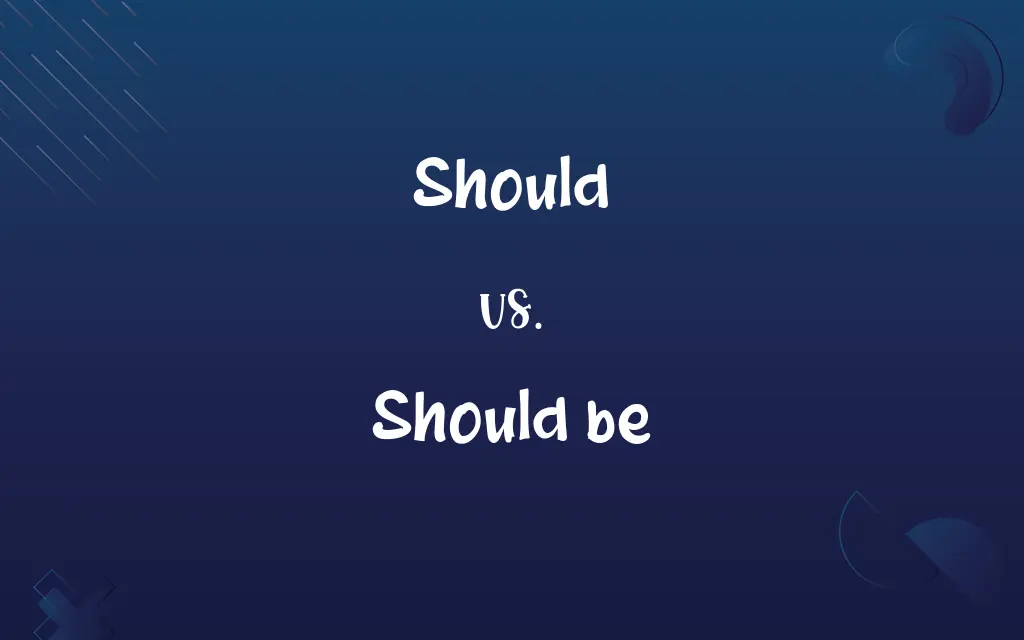Should vs. Should be: Know the Difference

By Shumaila Saeed || Published on February 12, 2024
"Should" implies obligation or recommendation, while "should be" implies an expected or desired state or condition.

Key Differences
"Should" is used to express obligation, duty, or correctness, often suggesting that something is the right or sensible thing to do. For example, "You should study for your exams." On the other hand, "should be" is used to indicate what is expected or supposed to be the case. For instance, "The streets should be empty at this hour."
Shumaila Saeed
Feb 12, 2024
In terms of advice or recommendation, "should" is direct, such as in "You should see a doctor." Here, it's a specific suggestion. Conversely, "should be" is used for general expectations or norms, as in "The doctor should be knowledgeable."
Shumaila Saeed
Feb 12, 2024
"Should" can imply a personal opinion or suggestion, like in "You should try the new restaurant." This is more about personal advice. In contrast, "should be" implies a state that is expected or believed to be true, such as "The restaurant should be open at 7 PM."
Shumaila Saeed
Feb 12, 2024
When expressing probability or expectation, "should" is more about the likelihood of actions, as in "He should arrive by 8 PM." In contrast, "should be" relates to the state or condition expected, like "The room should be ready for the meeting."
Shumaila Saeed
Feb 12, 2024
"Should" can indicate a condition that is desirable or preferable, such as "You should save money for emergencies." However, "should be" often refers to a desirable state in a broader, sometimes less personal context, like "Savings should be a priority in financial planning."
Shumaila Saeed
Feb 12, 2024
ADVERTISEMENT
Comparison Chart
Usage
Expresses obligation, duty, or recommendation
Indicates an expected or desired state or condition
Shumaila Saeed
Feb 12, 2024
Context
Often personal advice or suggestion
Usually a general expectation or norm
Shumaila Saeed
Feb 12, 2024
Relation to Action
Directly relates to specific actions or behaviors
Pertains to states, conditions, or general situations
Shumaila Saeed
Feb 12, 2024
Implication
Implies a preferable or advisable action
Suggests how things are expected to be
Shumaila Saeed
Feb 12, 2024
ADVERTISEMENT
Should and Should be Definitions
Should
Should implies a recommendation or advice.
You should wear a helmet while biking.
Shumaila Saeed
Jan 25, 2024
Should be
Should be suggests a likely or supposed condition.
The roads should be busy during rush hour.
Shumaila Saeed
Jan 25, 2024
Should
Should expresses an obligation or duty.
You should respect your elders.
Shumaila Saeed
Jan 25, 2024
Should be
Should be expresses a norm or standard.
A good leader should be fair and just.
Shumaila Saeed
Jan 25, 2024
Should
Should conveys a condition for a desirable outcome.
You should study hard to do well in exams.
Shumaila Saeed
Jan 25, 2024
ADVERTISEMENT
Should be
Should be conveys an anticipated or desired situation.
The project should be completed by next month.
Shumaila Saeed
Jan 25, 2024
Should
Should indicates a probable truth or fact.
He should know the answer to that question.
Shumaila Saeed
Jan 25, 2024
Should be
Should be indicates an expected or ideal state.
The room should be clean before guests arrive.
Shumaila Saeed
Jan 25, 2024
Should
(auxiliary) Ought to; indicating opinion, advice, or instruction, about what is required or desirable.
Shumaila Saeed
Jan 22, 2024
Should be
Should be implies a condition that is considered appropriate.
Homework should be challenging yet doable.
Shumaila Saeed
Jan 25, 2024
Should
Used to issue an instruction (traditionally seen as carrying less force of authority than alternatives such as 'shall' or 'must').
You should never drink and drive.
The law is clear that you should always wear a seat belt.
The manual says that this switch should be in the 'off' position.
Shumaila Saeed
Jan 22, 2024
Should
Used to give advice or opinion that an action is, or would have been, beneficial or desirable.
You should go and see that film. I think you'll enjoy it.
I should exercise more often, but I’m too lazy.
She should not have been so rude.
Shumaila Saeed
Jan 22, 2024
Should
(informal) With verbs such as 'see' or 'hear', usually in the second person, used to point out something remarkable in either a good or bad way.
You should see his new apartment. It's like a palace!
If you think her piano playing is bad, you should hear her sing!
Shumaila Saeed
Jan 22, 2024
Should
In questions, asks what is correct, proper, desirable, etc.
What do you think? What should I do?
Shumaila Saeed
Jan 22, 2024
Should
Indicates that something is expected to have happened or to be the case now.
They should have finished by now; I'll call them to check.
My fruit trees should be in flower, but the cold spring has set them back.
Shumaila Saeed
Jan 22, 2024
Should
Will be likely to (become or do something); indicates a degree of possibility or probability that the stated thing will happen or be true in the future.
They should have it finished by Friday.
When you press this button, the pilot flame should ignite.
You should be warm enough with that coat.
Shumaila Saeed
Jan 22, 2024
Should
Used to form a variant of the present subjunctive, expressing a state or action that is hypothetical, potential, mandated, etc.
If I should be late, go without me.
Should you need extra blankets, you will find them in the closet.
The man demanded that he should be allowed entry.
I'm surprised that he should say that.
Shumaila Saeed
Jan 22, 2024
Should
Used to express a conditional outcome.
If I had not been so tired, I should have laughed heartily.
Shumaila Saeed
Jan 22, 2024
Should
Used to impart a tentative, conjectural or polite nuance.
I should imagine that they have arrived by now.
I should think you would apologize.
Shumaila Saeed
Jan 22, 2024
Should
Used to express what the speaker would do in another person's situation, as a means of giving a suggestion or recommendation.
It's disgraceful the way that they've treated you. I should write and complain.
Shumaila Saeed
Jan 22, 2024
Should
To make a statement of what ought to be true, as opposed to reality. en
Shumaila Saeed
Jan 22, 2024
Should
Something that ought to be the case as opposed to already being the case.
Shumaila Saeed
Jan 22, 2024
Should
Used as an auxiliary verb, to express a conditional or contingent act or state, or as a supposition of an actual fact; also, to express moral obligation (see Shall); e. g.: they should have come last week; if I should go; I should think you could go.
Shumaila Saeed
Jan 22, 2024
Should
Should suggests a likely event or condition.
She should arrive by 3 PM.
Shumaila Saeed
Jan 25, 2024
Repeatedly Asked Queries
What does 'should be' imply?
It indicates an expected or desired state or condition.
Shumaila Saeed
Feb 12, 2024
Is 'should be' used for expressing certainty?
It's more about expectation than certainty.
Shumaila Saeed
Feb 12, 2024
Does 'should' always imply obligation?
Not always; it can also suggest advisability or probability.
Shumaila Saeed
Feb 12, 2024
What does 'should' indicate?
It suggests advice, obligation, or likelihood.
Shumaila Saeed
Feb 12, 2024
How does 'should be' differ in meaning from 'is'?
'Should be' suggests expectation, while 'is' states a fact.
Shumaila Saeed
Feb 12, 2024
Is 'should be' used for hypothetical situations?
It can be, especially to suggest what would be ideal.
Shumaila Saeed
Feb 12, 2024
Does 'should' express a command?
It's softer than a command, more of a suggestion.
Shumaila Saeed
Feb 12, 2024
Can 'should' imply a personal opinion?
Yes, it often conveys a speaker's opinion or advice.
Shumaila Saeed
Feb 12, 2024
Can 'should' be used for giving advice?
Yes, it's commonly used for recommendations.
Shumaila Saeed
Feb 12, 2024
Is 'should' used in formal contexts?
Yes, it's appropriate in both formal and informal contexts.
Shumaila Saeed
Feb 12, 2024
Can 'should' be used to express regret?
Yes, in the past tense form, e.g., "I should have called."
Shumaila Saeed
Feb 12, 2024
Does 'should be' always relate to the future?
Mostly, but it can refer to present expectations too.
Shumaila Saeed
Feb 12, 2024
Can 'should be' be replaced with 'ought to be'?
Often, though 'ought to be' can sound more formal or strong.
Shumaila Saeed
Feb 12, 2024
Is 'should be' commonly used in everyday speech?
Yes, it's frequently used in various contexts.
Shumaila Saeed
Feb 12, 2024
Can 'should be' indicate norms or standards?
Yes, it often reflects what is considered normal or standard.
Shumaila Saeed
Feb 12, 2024
Does 'should be' imply a level of uncertainty?
It implies some uncertainty, as it's about expectations.
Shumaila Saeed
Feb 12, 2024
Is 'should' used for future possibilities?
Yes, it can suggest what is likely to happen in the future.
Shumaila Saeed
Feb 12, 2024
How does context affect the meaning of 'should'?
Context can determine whether it's about advice, obligation, or likelihood.
Shumaila Saeed
Feb 12, 2024
Can 'should' be used conditionally?
Yes, often in conditional sentences, e.g., "If you're hungry, you should eat."
Shumaila Saeed
Feb 12, 2024
Is 'should be' used in questions?
Yes, especially for seeking confirmation or opinion, e.g., "Shouldn't it be done by now?"
Shumaila Saeed
Feb 12, 2024
Share this page
Link for your blog / website
HTML
Link to share via messenger
About Author
Written by
Shumaila SaeedShumaila Saeed, an expert content creator with 6 years of experience, specializes in distilling complex topics into easily digestible comparisons, shining a light on the nuances that both inform and educate readers with clarity and accuracy.








































































